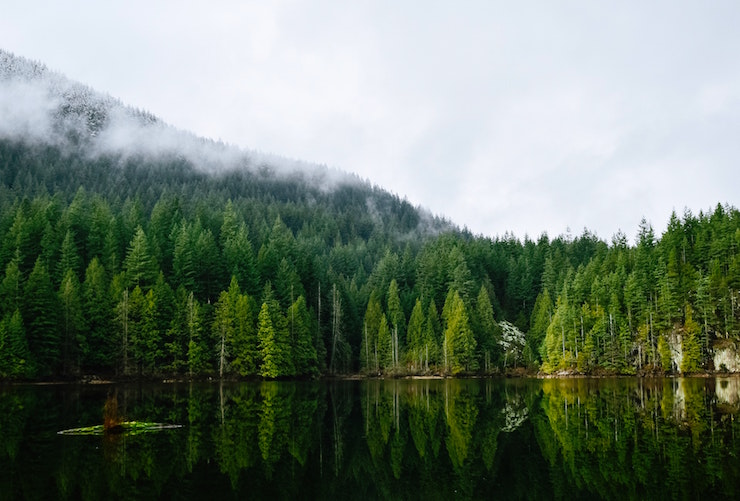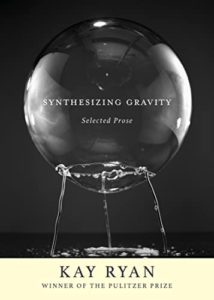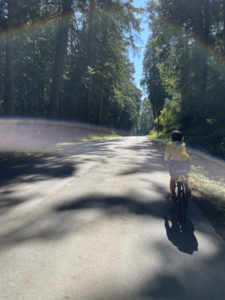The Poet Takes a Bike Ride
I have usually done this on a bicycle.”
– Kay Ryan, “The Poet Takes a Walk,” from Synthesizing Gravity
When does one become a poet?
When I have led poetry workshops and participants have asked me this question, I have told them, If you write poems, you’re a poet. But that answer doesn’t satisfy me.
Is it having a poem published? Or does it need to be a chapbook? Does it have to win a prize? Or get noticed by someone noticeable?
But—I argue with myself—you have notebooks full of poems.
Most aren’t anything special, I counter.
But you’ve haiku-ed every single day for five years. You’re in year six.
Most aren’t proper haiku.
But you think in poetry. You feel poetry, like blood coursing along every road you bike. When pedaling uphill in Canada, you passed a gate with a bee logo, and the sign said the name of the farm was Innisfree, and you recited Yeats’ poem aloud, very breathily.
Well, yes. There’s that.
So there.
One person who is definitely a poet and who has struggled with what that means is Kay Ryan. She’s won a Pulitzer prize and has served two terms as the U.S. poet laureate. That means she and I don’t have a whole lot in common, other than the fact that we both like poetry and we both like bicycles. We also both feel conflicted about what it means to be a poet.
For this is a fact: Though a person may be absolutely destined to be a poet, the person doesn’t altogether understand this at first. For a long time the person just feels silly.”
– Kay Ryan, “Do You Like It?” from Synthesizing Gravity
Yes, silly.
As silly as Frederick, composing words while other hard-working mice prepare for winter. Here I am at my desk/picnic table, with an old dog on either side of me, while I scribble in pencil. Some of those scribbles get typed and revised on a screen. A few of them make their way into the world.
This summer I did readings of Rainbow Crow at libraries. I was surprised to find that wearing a pink cowgirl hat with a sparkly tiara glued to the front did not make me feel silly. My hat is fun. My crow poems are fun. We all had a lot of fun.
But when one newspaper ran a story with the headline, “Poet, officials help launch summer reading program,” I felt silly again.
Here’s where I don’t feel silly: on a bicycle. My mother promised I could see Grease if I learned to ride, and that was all the motivation I needed. Forty years later, I’m still riding. I live in an area that is a cycling destination, and riding clears my head and gives me fresh perspective.
So when I was finally ready to ask myself the question Kay Ryan asked herself on a bike ride across America — “So the bicycle trip was four thousand miles to say yes or no to poetry,” she writes — I asked it on a bike ride. Mine was only 160 miles and far more luxurious than Ryan’s, but hey, I’m not 30 years old, as she was on her trek.
In her essay, Ryan muses about how being a poet resembles being a cockroach or an anglerfish. Poets are “hardy little survivors,” she tells us. We cannot “evolve beyond the comical, partial creature [we are].” When I tell people I write for magazines, they are impressed. When I tell them I write poetry, they look at me as if I have confessed to being a cockroach who dreams of becoming an anglerfish.
Ryan’s answer to her question came in the form of another question, while powering her two wheels up the Colorado Rockies. (That’s where revelation should come, far from home.) Hers came like a “stunt kite” sweeping through the pines: “Do you like it?”
During my five days bicycling the Gulf Islands of British Columbia, I didn’t do all the writerly things I usually do on vacation — didn’t write or read poems. I just biked up punchy hills and around sharp bends. For the first time in a long time, I was just Megan, from Texas, here with John for their 30th anniversary. Not a poet. Not my losses. Just a girl on a road bike with a Curious George jersey.
“What do you think you’ll bring back from this trip?” a woman asked me on our final ferry ride back to the mainland. I’d heard her tell a stranger that she was writing a book about losing her mother, and so I admitted that I’d written a book about the same thing. We compared publishing notes while keeping an eye out for whales.
No whales appeared. No answer in the form of a question arose from the ocean.
Safely home, I started my laundry. Then I got out my haiku journal and wrote one for each day of the trip. I started reading a new poetry collection. I journaled about all the moth poems that were suddenly cropping up (what was that about?). And I got back on my bike.
Your Turn
1. Hello, poets. Do you claim the label? Do you ever feel silly about loving poetry?
2. Who is a real, professional poet with whom you find some affinity?
3. Share your August pages. Sliced, started, and abandoned are all fair game.
August’s Pages
Poetry
Earth Song, edited by Sara Barkat
Poetry for Young People: Edna St. Vincent Millay, edited by Frances Schoonmaker, illus. Mike Bryce
Picture Books and Early Readers
Arrow to the Sun, by Gerald McDermott
Beatrix Potter and Her Paint Box, by David McPhail
Middle Grade and YA
The Cat Who Saved Books, by Sosuke Natsukawa (Join us for Children’s Book Club, next Friday, August 15!)
When You Reach Me, by Rebecca Stead
Grownups
The Maltese Falcon, by Dashiell Hammet
Laurus, by Eugene Vodolazkin
Photo by Jeremy Allouche, Creative Commons, via Unsplash. Post by Megan Willome.
- Perspective: The Two, The Only: Calvin and Hobbes - December 16, 2022
- Children’s Book Club: A Very Haunted Christmas - December 9, 2022
- By Heart: ‘The night is darkening round me’ by Emily Brontë - December 2, 2022



Glynn says
Bike riding is a form of poetry. I know you’re surprised to hear me say that. You might also be surprised to know how much writing I got done while biking.
And you read (for grownups) two authors who are personal favorites. I first read Dashieill Hammett back in the 1970s, and Eugene Vodolazkin in 2015. If you liked “Laurus,” his “The Aviator” and “Brisbane” are very different books with similar themes.
August reading:
Fiction
Christimastime 1940 by Linda Mahkovec
Signal Moon by Kate Quinn
Mystery
Death at Eden’s End by Jo Alllen
The Mazaroff Murder by J.S. Feltcher
Murder at the University by Faith Martin
Five Decembers by James Kestrel (a noir 1940s story worthy of Hammett)
Magic Mirror by Michaela Thompson
Non-fiction
Eliot after ‘The Waste Land’ by Robert Crawford
The Way is Made by Walking by Arthur Paul Boer
Edgar Lee Masters: A Biography by Herbert Russell
War and Reconstruction in Mississippi 1861-1875 by Charles Mills (this was first published in 1935, part of a project by the Works Projects Administration, or WPA, to capture the oral histories of people who experienced the Civil War and its aftermath)
Poetry
Vinegar Hill by Colm Toibin
Bad Hobby by Kathy Fagan
The Owl and the Nightingale, translated by Simon Armitage
Megan Willome says
“Bike riding is a form of poetry.”—yes!
I am not at all surprised to hear that you got writing done while biking. It happens for me too.
I had a lot of fun with “The Maltese Falcon,” having seen the movie many times but liking the book better. As to “Laurus,” I’m not sure I actually liked it, but it’s a great book to discuss, and I’m glad I read it. I’ve been reading along with the Close Reads folks.
Nan Henke says
I love this insight into poets’ self-questionsing.